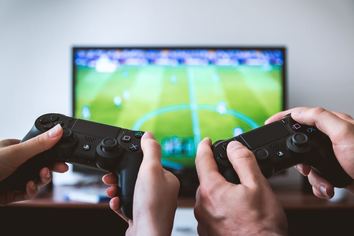 There has been quite a bit of controversial press regarding internet game addiction. More research is showing that people can become addicted to digital gaming. The World Health Organization (WHO) has defined Gaming Disorder in the draft revision of the International Classification of Diseases (ICD-11), Here is a link to WHO Gaming Disorder on the World Health Organization website. WHO states "for gaming disorder to be diagnosed, the behaviour pattern must be of sufficient severity to result in significant impairment in personal, family, social, educational, occupational or other important areas of functioning and would normally have been evident for at least 12 months." The DSM-5 (diagnostic manual for psychiatrists) was unveiled in May 2013 and it has Internet Gaming Disorder as a condition that requires more research, before it can be added as a disorder that can be diagnosed. Here is a link to Internet Gaming Disorder on the DSM-5 website. If more research is done, this condition may very well become a diagnosis in the next revision of the DSM. Some professionals in the field feel that internet game addiction is a fad and not a real phenomenon. Having worked with adolescents and young adults, I have seen my share of internet use issues. Some were just issues and were easily remedied, others were fitting an addictive pattern of behavior. If this was a condition with a diagnosis, professionals working with this population would be using it as a primary or secondary diagnosis. When the use of internet games starts to seriously impede your life functioning, you have a problem in this area. Some people report playing digital games as a stress reliever, a way to unwind at the end of a work/school day, or a way to escape from their life and the reality they face every day. Some people enjoy the fantasy world much more than reality. Some symptoms of gaming addiction include; declining grades (students), increased gaming in the face of negative consequences, focusing on gaming and not other activities you enjoy, lying about game use and feeling anxious when unable to play. There is usually an underlying issue as to why you are using internet games so frequently. Here are some things you can do if you or a loved one is spending too much time gaming:
If you find that stopping digital gaming is an overwhelming and daunting task, seek professional help. A psychologist or mental health professional can assist you with a treatment plan, provide support and address underlying mental health issues. Disclaimer: This blog is for informational purposes only and is not meant as a replacement for treatment or therapy.
19 Comments
4/13/2023 10:29:52 pm
Excellent! Thank you for this post. This is very helpful and resourceful article. Congrats and keep posting!
Reply
4/14/2023 12:00:40 am
Such a lot of learning this thought .highly recommended Article. https://playonlineph.com/swerte-gaming-team-faw0y/
Reply
12/7/2023 07:31:56 pm
Thanks for sharing this helpful information! I'm excited to check out some of your articles on your future posts.
Reply
12/8/2023 12:56:20 am
Thanks for sharing this helpful information! I'm excited to check out some of your articles on your future posts.
Reply
<a href="https://bettowin.ph/tala888//">Click and Get 199 Bonus Now</a>
Reply
<a href="https://bettowin.ph/yesjili//">Click and Get 199 Bonus Now</a>
Reply
I was pleasantly surprised to find so much helpful information on your website when I recently found it. Navigation is made easy by the layout. As seen by your actions, we truly appreciate your dedication to producing work of the highest caliber. You're doing a tremendous job. My webpage can be found at
Reply
3/19/2024 12:24:58 am
Your post is essential today. Thanks for sharing, by the way.
Reply
5/10/2024 06:16:34 am
Thanks for sharing this useful information! Hope that you will continue with the kind of stuff you are doing.
Reply
Leave a Reply. |
AuthorDr. Deb is a successful Psychologist who practices in New York City. She is an Anxiety Specialist who works with adolescents and adults providing both individual and couples counseling. Categories
All
|
NAVIGATION
|
CONNECTSHARE THIS PAGE |
CONTACT MeDebra O'Shea, Psy.D PLLC
14 Penn Plaza New York, NY 10122 (347) 480-8095 |
LOCATIONWebsite by TherapyPrime
|

